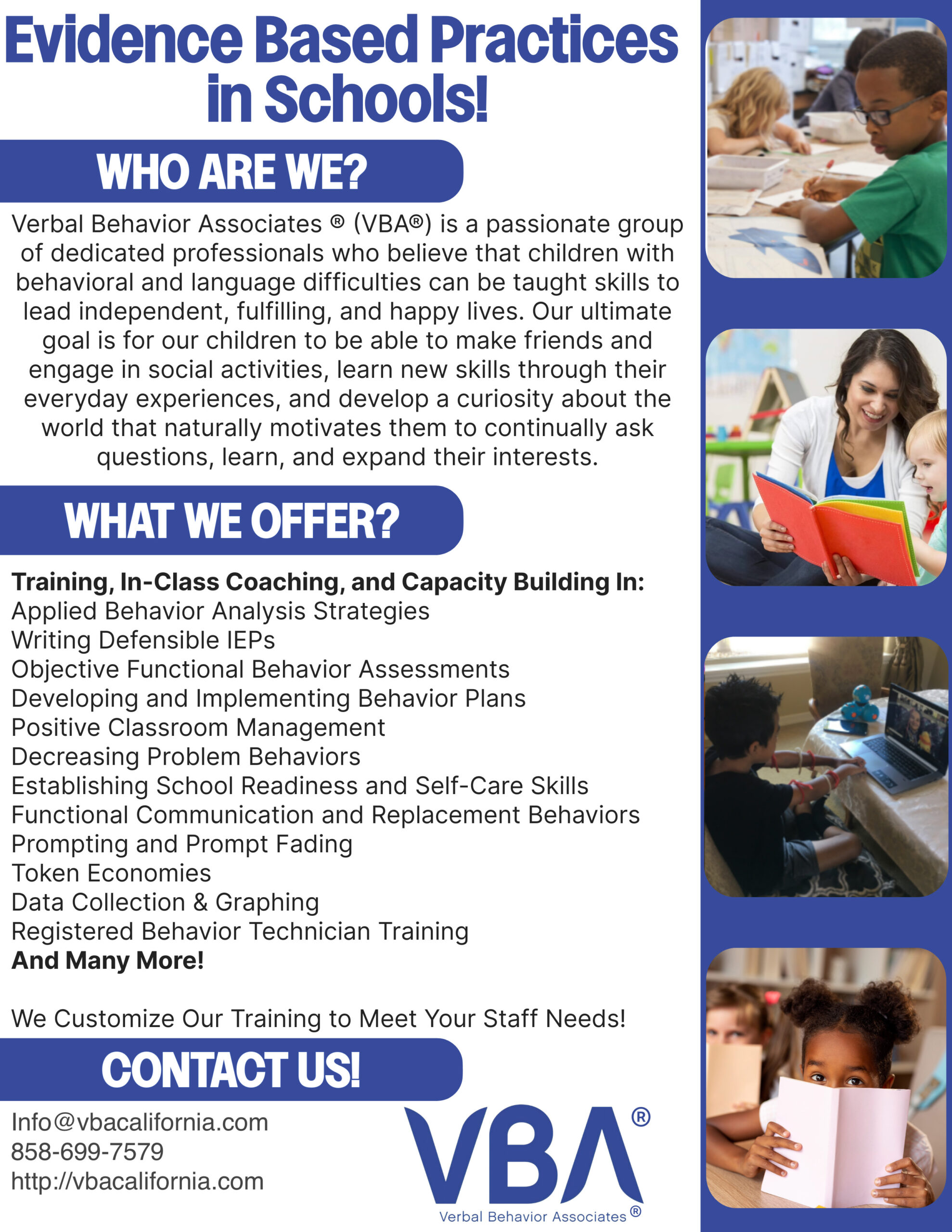Verbal Behavior Associates® provides applied behavior analysis (ABA) services to children with impacted by autism or other developmental delays as well as children who demonstrate moderate-severe behavior problems.
Applied Behavior Analysis is the scientific application of the principles of learning and motivation to increase behaviors and skills of social significance. ABA is empirically validated as an effective intervention in teaching the skills to improve the core skill deficits of autism. The effectiveness of ABA interventions has also been demonstrated across thousands of published research studies with various populations of individuals, settings, and behaviors.
Our instructional intervention addresses clients’ skill deficits to increase overall independence and specifically Building independence through language development®
- Increasing functional communication
- Expanding listener and speaker skills
- Reducing maladaptive behavior and teaching appropriate replacement behaviors
- Social Skills
- Self-Management/Adaptive skills
- Gross and Fine motor skills related to academic readiness
- Learning Capabilities: Generalized Imitation, Incidental Language Learning, Observational Learning
In addition to providing direct ABA services to clients in the home, school, and community settings, we also collaborate and support school districts in the San Diego, Orange, and South Inland Empire counties.
We provide school consultations, independent evaluations, training for district paraprofessionals, and workshops for state agencies, private preschools, and other public and private organizations.
Verbal Behavior Associates® Locations
At Verbal Behavior Associates® we proudly serve several communities throughout California. With a presence in San Diego, Orange County, Los Angeles County, Riverside County, and East Bay, we are able to better serve those seeking help with ABA Therapy in those and surrounding areas.
Locations and Contact
Main Office:
Address: 14251 Danielson St, Poway, CA 92064
Phone Number: 858-699-7579
Email: Info@VBACalifornia.com
Hours of Operations
Monday: 8:00am-5:00pm PST
Tuesday: 8:00am-5:00pm PST
Wednesday: 8:00am-5:00pm PST
Thursday: 8:00am-5:00pm PST
Friday: 8:00am-5:00pm PST
Saturday: Closed
Sunday: Closed
Center for Behavior Change:
Address: 12443 Woodside Ave, Lakeside, CA 92040
Email: CBC@vbacalifornia.com
Phone Number: (619) 805-7333
Hours of Operations
Sunday CLOSED
Monday 9:00am-2:00pm PST
Tuesday 9:00am-2:00pm PST
Wednesday 9:00am-2:00pm PST
Thursday 9:00am-2:00pm PST
Friday: 9:00am-2:00pm PST
Learn more about Center for Behavior Change (CBC)
Services
Verbal Behavior Associates® is a passionate group of dedicated professionals who believe that children with behavioral and language difficulties can be taught skills to lead independent, fulfilling, and happy lives. At Verbal Behavior Associates®, our ultimate goal is for our children to be able to make friends and engage in social activities, learn new skills through their everyday experiences, and develop a curiosity about the world that naturally motivates them to continually ask questions, learn, and expand their interests Our programming and interventions are focused on Giving Children a Voice®.
At Verbal Behavior Associates®, children are always our first priority. Applied Behavior Analysis (ABA) focuses on behavioral issues and seeks to work with children to help them improve their behaviors and skills of social significance. With a focus on improving the skill deficits in children with autism or other developmental differences, this method of therapy has been scientifically developed and empirically validated. VBA® is committed to working with schools, individuals, and organizations in the areas we serve. Learn more about what our non-public agency does.
Services offered by VBA®
Home and community based
- Direct behavior therapy services (Early Intervention and beyond)
- Parent and Caregiver Training and Consultation
- Functional Behavior Assessment (FBA)
- Social Skills Groups
School Based Services
- Functional Behavior Assessment (FBA)
- Direct behavior therapy services
- Independent Educational Evaluation (IEE)
- Assessments for 1:1 or additional aide support
- Compensatory Education Services
- Teacher, aide, district-wide training
- District professional training
- Non-public school Center for Behavior Change
Areas of Focus in Treatment Offered by Verbal Behavior Associates®:
- Increasing functional communication
- Expanding listener and speaker skills
- Reducing maladaptive behavior and teaching appropriate replacement behaviors
- Social Skills
- Self-Management/Adaptive skills
- Gross and Fine motor skills related to academic readiness
- Learning Capabilities: Generalized Imitation, Incidental Language Learning, Observational Learning
- Building independence through language development®
Recent trainings include:
- Introduction to ABA
- Functions of Behavior: Forming and Testing the Hypothesis
- How to Effectively Implement a Behavior Plan
- Basic Verbal Operants
- Decreasing Behavior
- Teaching Self-Care Skills
- Data Collection
- Token Economy
- Preference Assessment
- RBT Ethics
SUCCESS looks different to each family!
Here are some meaningful accomplishments our families have achieved:
- Acquisition of skills that resulted in the ability to participate in the general education setting without any support.
- Saying “mama” for the first time.
- Looking and smiling directly at the camera when taking a picture!
- The ability to eat at a restaurant, go to a birthday party, and sit through an entire movie!
- The ability to answer parents’ questions about what they did at school, what they learned and games they played with friends.
- Asking parents and caregivers “why” and to “tell me more!”
- “Learning” new hobbies: acquiring a new favorite game, toy, or activity
- Significant reduction in problem behaviors that allow for integration back into school site programs.


